How truck starts
« previous post | next post »
Reader KR asks:
How can I prove to an acquaintance that the word "truck" in English is standardly pronounced with an intial "ch" sound?
KR presupposes a conclusion that's a bit over-simplified. There's some variation here, and I don't think we have very good evidence about the distribution and relative frequency of the variants. But he's basically right: the initial consonant of "truck" in American English is often (usually?) palatal or at least post-alveolar rather than alveolar, and its release is often (usually?) strongly affricated. And in some pronunciations at least, the /t/ and the /r/ are completely co-articulated as a sort of labialized retroflex affricate.
Let's start by defining and exemplifying some of the terms. In English /t/, /d/, /s/, /z/ the blade of the tongue usually touches or comes near to the "alveolar ridge", just behind the upper front teeth. Here's how this is usually pictured:
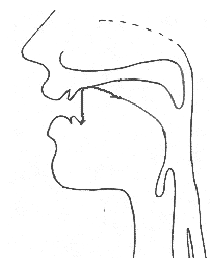
In the fricatives /ʃ/ and /ʒ/ (as in ashen and azure), and in the affricates that the IPA insists on representing with sequences like /tʃ/ and /dʒ/ (as in urchin and urging), the blade of the tongue is further back along the hard palate:
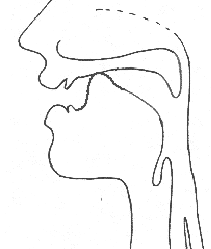
You can feel this difference for yourself if you make an extended /s/ sound, as in the start of the word suck, and compare the tongue position to what you do in making an extended /ʃ/ sound, as in the start of the word shuck.
You should also be able to hear that the sound of the /s/ is somehow higher in frequency than the sound of the /ʃ/. This is because the noise created by turbulent flow at the constriction is shaped by the resonant cavity it encounters on the way out of the mouth — and a larger cavity has lower-frequency resonances.
At this point, if you want, you can skip ahead and try the same proprioceptive experiment with (say) tuck vs. truck. And maybe this would be enough to persuade KR's friend. But in case it isn't, we're going to head out on a small journey into the jungle of real-world pronunciations.
What does these place-of-articulation differences look like in a spectrogram? Well, here's a contrast-filled phrase from NPR's archives ("Moms Brawl at Chuck E. Cheese", 3/4/2008):
Audio clip: Adobe Flash Player (version 9 or above) is required to play this audio clip. Download the latest version here. You also need to have JavaScript enabled in your browser.
____ _1 2 3 4 5
(no) offense to Chuck E. Cheese
I've labelled five fricative regions. (You can see the numbers better if you embiggen the spectrogram by clicking on it.) We'll ignore #1, which is the /f/ of "offense". The others:
2: [s], corresponding to the final /s/ of "offense" and the initial /t/ of "to", which have merged phonetically into a long [s] sound. (Don't ask, that's another thing.)
3: [ʃ], from the initial consonant in "Chuck".
4: [ʃ], from the initial consonant in "Cheese".
5. [z], from the final consonant in "Cheese". (It's phonetically more of an [s], as word-final /z/ often is in English — the apparent "voice bar" at the bottom of the frequency range is — I think — due mainly if not entirely to the background music.)
Details aside, you can see that the fricative parts of the post-alveolar affricates #3 and #4 are "lower" than the alveolar fricatives #2 and #5.
Here are some other comparisons from fragments of NPR's online archives. Note that these are different speakers, different recording conditions, and so on, though the phonological context is consistent.
/s/ vs. /ʃ/:
|
Audio clip: Adobe Flash Player (version 9 or above) is required to play this audio clip. Download the latest version here. You also need to have JavaScript enabled in your browser. |
Audio clip: Adobe Flash Player (version 9 or above) is required to play this audio clip. Download the latest version here. You also need to have JavaScript enabled in your browser. |
| "to suck" | "to shuck" |
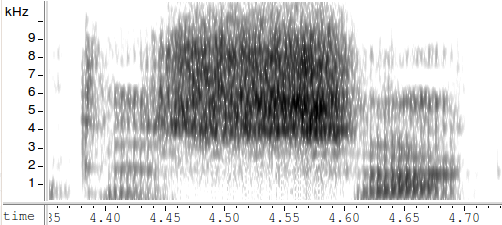 |
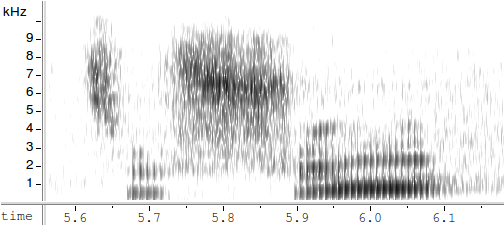 |
And the same again:
|
Audio clip: Adobe Flash Player (version 9 or above) is required to play this audio clip. Download the latest version here. You also need to have JavaScript enabled in your browser. |
Audio clip: Adobe Flash Player (version 9 or above) is required to play this audio clip. Download the latest version here. You also need to have JavaScript enabled in your browser. |
| "to suck" | "to shuck" |
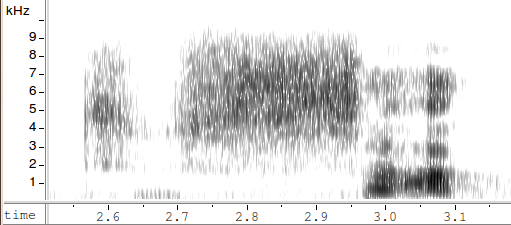 |
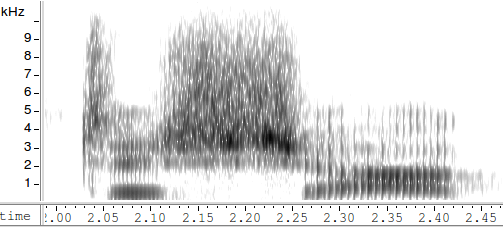 |
Now a couple of examples of Chuck (including the "Moms Brawl" case):
|
Audio clip: Adobe Flash Player (version 9 or above) is required to play this audio clip. Download the latest version here. You also need to have JavaScript enabled in your browser. |
Audio clip: Adobe Flash Player (version 9 or above) is required to play this audio clip. Download the latest version here. You also need to have JavaScript enabled in your browser. |
| "to chuck" | "to chuck" |
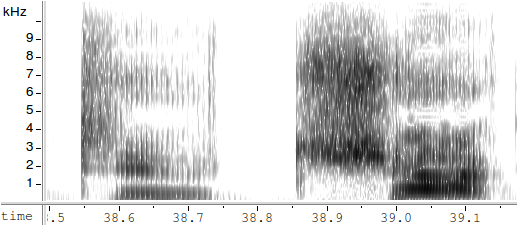 |
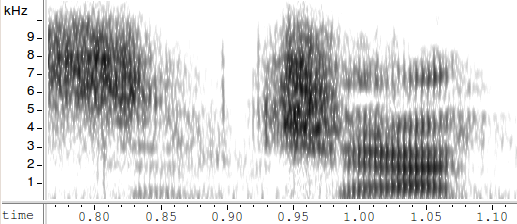 |
And finally, we can compare tuck and truck:
|
Audio clip: Adobe Flash Player (version 9 or above) is required to play this audio clip. Download the latest version here. You also need to have JavaScript enabled in your browser. |
Audio clip: Adobe Flash Player (version 9 or above) is required to play this audio clip. Download the latest version here. You also need to have JavaScript enabled in your browser. |
| "to tuck" | "to truck" |
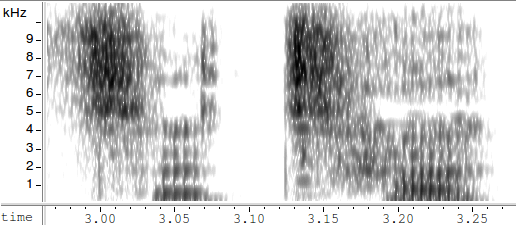 |
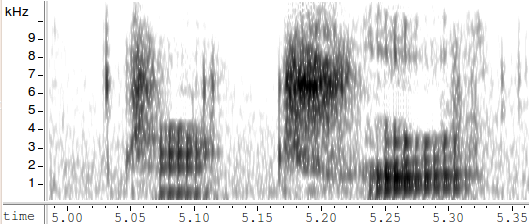 |
You can see that the onset of truck has a fairly prominent low-frequency resonance — generally lower and more prominent, in fact, than is visible in the instances of chuck we looked at.
Here's another pair for comparison, where essentially the same thing is visible:
|
Audio clip: Adobe Flash Player (version 9 or above) is required to play this audio clip. Download the latest version here. You also need to have JavaScript enabled in your browser. |
Audio clip: Adobe Flash Player (version 9 or above) is required to play this audio clip. Download the latest version here. You also need to have JavaScript enabled in your browser. |
| "to tuck" | "to truckloads" |
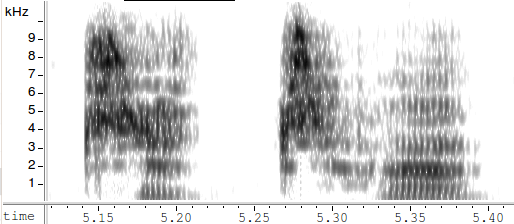 |
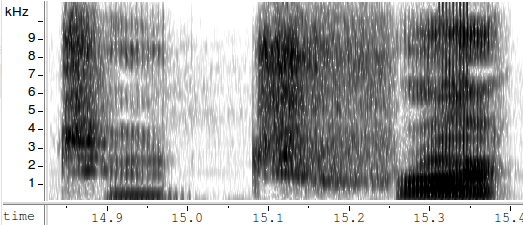 |
Of course, these are examples, not proofs. I took the first pair of instances of each "to _uck" pattern that I found in the NPR archives, which supports the view that these are not rare phenomena; but English /r/ is a many-splendored thing, so caution is in order.
(See e.g. Pierre Delattre and Donald Freeman, "A dialect study of American R's by X-ray motion picture", 1968; John Westbury et al., "Differences among speakers in lingual articulation for American English /ɹ/", 1999; Jeff Mielke et al., "Covert /r/ allophony in English: variation in a socially uninhibited sound pattern", 2006; Mark Tiede et al., "Variability of North American English /r/ production in response to palatal perturbation", 2010; Eleanor Lawson et al., "The social stratification of tongue shape for postvocalic /r/ in Scottish English", 2011; etc.)
Update — Coverage earlier this year in John Wells's blog: "how do we pronounce train?", 3/22/2011. Link courtesy of Andrej Bjelaković in the comments.

Victor Mair said,
August 9, 2011 @ 8:59 am
Until I read this post, I was certain that my "truck" started with a "tr-". Now I'm not at all sure about that. Tr- tr- tr-…; it just won't start. Chr-, chr-, chr-, chruck; ahhh, there it goes.
William Ockham said,
August 9, 2011 @ 9:07 am
I was initially very skeptical about this idea and I didn't really follow the post very well, but I found an easier way to convince myself that this is (mostly) true. I just tried to say "chruck". It sounds just like "truck".
James said,
August 9, 2011 @ 9:13 am
One of my first revelations studying phonetics as an undergrad was that 'strawberry' can start /shch/. I was adamant it couldn't possibly be true. I was wrong :)
Nathan said,
August 9, 2011 @ 9:16 am
I disagree that "chruck" sounds just like "truck". I've heard several native Spanish speakers making exactly this error. If you start too palatal, it's noticeably non-native English.
John Lawler said,
August 9, 2011 @ 9:21 am
When my son was very young he was entranced by Star Wars figures (as were many others). Two of the standard figures were the Imperial Storm Trooper (from Star Wars) and the Imperial Snow Troopers (from The Empire Strikes Back). He pronounced trooper as ['tʃʰupəɹ] and he knew what the -er suffix meant. But he wasn't in school yet and didn't know anything else about the word trooper.I asked him once what he thought a Snow Trooper did. His response: "I guess they probably just ['tʃʰup 'sno]".
Lazar said,
August 9, 2011 @ 9:29 am
My "truck" and "strong" have a brief, whistled transitional fricative between the /t/ and /r/ (which I think is unavoidable), but it's not /tʃ/. For me, "chruck" sounds very different from "truck" – if for no other reason than that /tʃ/ uses a laminal [s], and my transitional sound is apical. I'm from Massachusetts; I remember once posting some sound files for a phonetically-inclined Wisconsite (who definitely did have "tr"~"chr" convergence), and he was surprised by how conservative my pronunciations sounded.
Lazar said,
August 9, 2011 @ 9:32 am
Sorry, that should be "/tʃ/ uses a laminal [ʃ]", of course. But to expand on this point, I should note that my transitional sound feels closer to the alveolar articulation of the preceding [t] than to the postalveolar articulation of the following [r]. It seems most like the apical [s] of European Spanish, for example.
Pflaumbaum said,
August 9, 2011 @ 9:33 am
I believe it's quite common for children to write chrain and chree for train and tree when they're learning to spell.
Is /d/ too realised as [dʒ] or /d͡z/ or something in this position? And is the /t/ before /l/ in words like bottle articulated further back and/or as an affricate? Bokkle also seems to be common among children (as well as Sean Paul).
dw said,
August 9, 2011 @ 9:52 am
For me, "tr" does sound just like "chr".
You can observe the effect in slow-motion by considering a word like "factory".
First, pronounce it very formally as three syllables. The /t/ is alveolar as usual.
Then, compress it it into two syllables ("fack tree"), which is how I usually proonounce it. For me, the /t/ retreats to a post alveolar position and the word becomes homophonous with "fack chree".
dw said,
August 9, 2011 @ 10:01 am
@Pflaumbaum:
And is the /t/ before /l/ in words like bottle articulated further back and/or as an affricate? Bokkle also seems to be common among children (as well as Sean Paul).
In a word like "middle", I use an alveolar stop with lateral release — in IPA [dˡ ] I think this is pretty common for native English speakers.
The lateral release isn't velar, but it is relatively back in the mouth, and that is probably why some children or non-native-speakers approximate it with a velar stop — hence your "bokkle" for "bottle".
In "bottle" itself, I have [tˡ ], but for North American speakers and some others /t/-lenition may be a complicating factor.
toby said,
August 9, 2011 @ 10:05 am
My five-year-old daughter recently tried to correct me for calling a turtle a turtle; she said No, Daddy, that's called a churtle.
Coby Lubliner said,
August 9, 2011 @ 10:08 am
To someone familiar with a language that has both laminar-retroflex or postalveolar and alveolo-palatal sibilants, such as Polish or Serbocroat, it's obvious that the affricate sound at the beginning of "truck" is of the former variety, while that of "chuck" is of the latter.
To me, a curious aspect of the tr/ch connection is the fact that Vietnamese seems to transcribe Chinese ch as tr. According to Wikipedia, the surname Trân is the Vietnamese version of the Mandarin Chén (陳).
Coby Lubliner said,
August 9, 2011 @ 10:09 am
I lost a semicolon — I meant to write Chén.
Carl said,
August 9, 2011 @ 10:12 am
I can't hear 'truck is chuck' at all. Any time I try to put a /tʃr/ cluster at the start of a word it comes out as a separate syllable. That's probably due to the need for my tongue to slide backwards between /ʃ/ and /r/.
dw said,
August 9, 2011 @ 10:20 am
@Cory Lubliner
To someone familiar with a language that has both laminar-retroflex or postalveolar and alveolo-palatal sibilants, such as Polish or Serbocroat, it's obvious that the affricate sound at the beginning of "truck" is of the former variety, while that of "chuck" is of the latter.
But what would the initial consonant of *chruck be?
No one's claiming that "truck" is homophonous with "chuck".
Bathrobe said,
August 9, 2011 @ 10:38 am
This also has implications for the transliteration of English words into foreign languages.
The standard way of transliterating 'tr' or 'dr' into Chinese is as two syllables. For instance, in the Mainland version of Harry Potter, the name Draco Malfoy uses the transliteration 德拉科 délākē, which doesn't actually sound much like 'Draco'.
The Taiwanese version uses 跩哥 zhuǎigē, which surprisingly sounds closer to the original English.
Mark F. said,
August 9, 2011 @ 10:47 am
Watching kids just learning to spell can tell you things about your own pronunciation that you didn't realize. I had this "tr sounds like chr" epiphany when I saw writing samples on the wall outside my kid's class when he was in the first grade, and a lot of the kids spelled "tree" as "chree". In another case, I saw "community" spelled "comyidity", which seemed completely bizarre until I said it fast in the right context (they were talking about "community helpers").
Mark F. said,
August 9, 2011 @ 10:50 am
I skimmed the comments before adding mine, but I missed Pflaumbaum's. So anyway, I second what he said.
R. Henderson said,
August 9, 2011 @ 10:54 am
In kindergarten, I tried spelling "tree" with a "ch." I thought it very unfair that I got that exercise wrong.
JR said,
August 9, 2011 @ 11:10 am
I don't actually do this, although people in my area sometimes do. Maybe it has to do with spending too much time with my head in a book.
My sister says "chrain" but not "chree" and seems a little uncomfortable with "chruck."
dw said,
August 9, 2011 @ 11:14 am
@Carl:
I can't hear 'truck is chuck' at all. Any time I try to put a /tʃr/ cluster at the start of a word it comes out as a separate syllable. That's probably due to the need for my tongue to slide backwards between /ʃ/ and /r/.
Interesting! When I say "truck", the blade of my tongue is sliding backwards along the roof of my mouth, traversing the alveolar ridge, during the /ʃ/ segment. By the time we get to the /r/, the tip is already in place for the semi-retroflex approximant.
How would you describe your articulation of "truck"?
Ross Presser said,
August 9, 2011 @ 11:15 am
I'm not an expert at hearing at all … but as I repeat "truck chruck truck chruck" over and over, I feel my tongue moving. So they're not the same sound to me.
Áine ní Dhonnchadha said,
August 9, 2011 @ 11:23 am
My tr-, dr- are dangerously close to being just a retroflexed affricate. I mean, there's a *little* difference between Mandarin ch-/zh- and my tr-/dr-, but it's one of degree of retroflexion. (I think I also half-voice initial voiced consonants in English thanks to a lifetime of studying languages where half-voiced consonants exist, but that's a separate issue.)
Native Southern New Englander, Rhode Island rhotic+ accent.
Tim Martin said,
August 9, 2011 @ 11:24 am
1. I was taught in my introductory linguistics course that pronouncing "tr" as /tʃr/ (or something other than /tr/) is non-standard pronunciation for Americans. Is the reverse actually true?
2. Where exactly is the blade of the tongue, as opposed to the tip? (Note that "behind" is not an answer. How far behind? 3 millimeters?) If you were trying to teach someone to pronounce laminal and apical consonants, how would you teach them to use the right part of their tongue?
@Pflaumbaum: Is /d/ too realised as [dʒ] or /d͡z/ or something in this position?
I pronounce "tr" as "chr," and I indeed do the same thing with "dr". So "drunk" sounds like "jrunk." Most people I've talked to about this seem to be the same – if you affricate one (or whatever we're calling it), you affricate the other.
Boris said,
August 9, 2011 @ 11:32 am
I've been in the US for 20 years now (over 2/3 of my life) and this is the one construction I'm still (perceiving to) pronounce incorrectly. With truck, it usually comes out sounding like tshuck (not quite chuck, but close). Sometimes I try to compensate by using the Russian r sound in there because I feel the r gets lost otherwise. This also happens with things like "drive" coming out almost the same as "jive".
Does everyone say it that way or is this a true error on my part that I cannot quite resolve?
Russell said,
August 9, 2011 @ 11:44 am
I certainly have memories of my British friends pronouncing some tr-initial words (train, especially) in a way that was much more like an affricate than I would have expected.
andrewD said,
August 9, 2011 @ 11:47 am
Of course if you are English, you pronounce "Truck" as "Lorry" anyway
Bobbie said,
August 9, 2011 @ 11:53 am
Going in another direction, my African-American friend (raised in Virginia) says Srimp for Shrimp.
And as a mom, I can tell you that many parents worry when their children call that vehicle a word that starts with F!
dw said,
August 9, 2011 @ 11:56 am
@Tim:
The blade is "the part of the tongue below the center of the alveolar ridge when the tongue is at rest"
http://books.google.com/books?id=h1byJz_rWUcC&lpg=PP1&dq=the%20sounds%20of%20the%20worlds%20languages&pg=PA11#v=onepage&q=%22below%20the%20center%20of%20the%20alveolar%20ridge%22&f=false
xyzzyva said,
August 9, 2011 @ 11:56 am
@Pflaumbaum:
I think the voiceless cluster may be more prone to affrication because of the interplay of the aspiration with the approximant /ɹ/.
Notice this is much less common in str- clusters where the /t/ is usually unaspirated (though still possible, like James's shchawberry).
Now to consider my aspiration theory with respect to the other voiceless aspirates: /p/, /k/, and (oh no!) /tʃ/.
J. Goard said,
August 9, 2011 @ 12:24 pm
I had one Korean university student in an English conversation club who sounded ridiculous over-palatalizing "tr", and annoyingly corrected other students even after I told him multiple times that they sounded just fine.
I wonder if frequency plays a role for many speakers, like with the schwa-deletion in "every", "memory", etc. For me, a very palatal "truck" does sound quite a bit better than a comparable "trombone".
Jerry Friedman said,
August 9, 2011 @ 1:26 pm
@J. Goard: For one friend of mine, frequency doesn't seem to have anything to do with it. He was recommending the key lime pie at a restaurant in Albuquerque (almost two hours from where he lives) called Chombino's? Ciombino's? no, Trombino's.
I'm pretty sure I have no trouble saying [tr] and [dr] when I'm trying to speak clearly, as when I'm lecturing, but my natural pronunciation is affricated, at least for common words. For me, frequency might have something to do with it—say if I were telling someone about the commenter here who goes by "Trimegistus".
@Tim Martin: In my opinion, these affricated pronunciations are non-standard, but I'd bet the large majority uses them anyway.
@Boris: Your pronunciation would probably sound fairly normal to Americans (though of course I can't tell unless I hear it). Even a trace of an English r should be enough. I wouldn't recommend using a Russian r unless the person listening to you gets confused.
Pflaumbaum said,
August 9, 2011 @ 1:49 pm
@ xyzzyva –
In a paper (p.104ff) that MYL linked to in an earlier thread, the author agrees with you that allophones of /t/ in /tr-/ and /str-/ clusters are distinguished by +/- aspiration, but he describes /t/ as also being regularly realised as [c] in /str-/ clusters, so he disagrees with you about the frequency.
Tim Martin said,
August 9, 2011 @ 1:57 pm
@dw and Jerry: Thank you much!
Anon said,
August 9, 2011 @ 2:56 pm
What I think is most interesting is that the sequence "chr" never appears in written English (except when "chr" is pronounce like "kr"), and "chree" or "chrain" really look like they ought to be unpronounceable for English speakers. And yet it is how most of us speak.
Anon said,
August 9, 2011 @ 2:58 pm
Same is true of drive, which I pronounce like jrive. If I hadn't just written it myself, I would have said that it was unpronounceable.
Mick O said,
August 9, 2011 @ 2:59 pm
The typed word "choon" is common with a sizable group of (mostly) youthful urban and dance music fans as a way to call attention to a preferred "tune." Urban Dictionary attributes it to a Dutch accent, though my own experience was that I came across is most often from UK friends.
http://www.urbandictionary.com/define.php?term=choon
I only mention it here to suggest that the phenomenon is not limited just to 'tr.'
Rubrick said,
August 9, 2011 @ 3:13 pm
Most inschtructive.
xyzzyva said,
August 9, 2011 @ 3:15 pm
@Mick O,
That's the result of yod-coalescence, the by-now standard result of stressed clusters /tj, dj, sj, zj/ in those dialects (BrE, AuE) that don't feature yod-dropping to /t, d, s, z/ (like AmE).
Note that (most*) all dialects feature historical coalescence in post-stress position, as in nature, soldier, nation, vision, though by this point we just consider the former clusters to be /tʃ, dʒ, ʃ, ʒ/.
*My apologies to any less-familiar dialects immune to these processes
Pflaumbaum said,
August 9, 2011 @ 3:33 pm
@ Mick O –
Yes that's common with /tj-/ words in BrE. Unless I'm speaking carefully I have chune, chuna, chube, chuition etc., with no difference (as far as I can tell) from /tʃ-/. Also June and dune, Jew and due, juke and duke are homophones.
Dan said,
August 9, 2011 @ 4:22 pm
I never suspected that "truck" would be pronounced the same as "chruck." When I say "chruck" it sounds like I am saying "truck," but the position of my tongue is clearly different. With "truck" my tongue clearly rests on the alveolar ridge. The same goes for "tree/chree." I think the sounds really are different, but with my bad hearing I'm not sure. Maybe (as Coby Lubliner suggested above) if our language had words like "chree" our ears (healthy ones, at least) would do a better job distinguishing the two sounds.
Andrej Bjelaković said,
August 9, 2011 @ 4:41 pm
There was a post about this on John Wells's blog some time ago:
http://phonetic-blog.blogspot.com/2011/03/how-do-we-pronounce-train.html
Aaron Toivo said,
August 9, 2011 @ 5:42 pm
Having been alerted to this allophony some years ago, I started paying attention, and sure enough I hear "chree"/"chruck"/etc. in many peoples' speech. The auditory difference can be quite striking – at least to my ear – but with other speakers the difference can be hard to detect, and in the posted examples, I can barely hear it at all. The spectrograms are convincing, but there are probably samples out there somewhere with a much more obvious [ʧ] sound.
Still, the t-ʧ allophony before /r/ is not universal… I lack it myself. On other grounds I'm pretty sure my usual /r/ has little coronal involvement, so perhaps this explains why. My 'bunched'-type /r/ is primarily dorsal. But interestingly, I've noticed I do get some affrication of /k/ before it: "crumb" = [kxɹɐm] for example (skipping the sticky issue of transcribing the /r/ accurately). I've heard this k-affrication in the speech of others too, unless I'm very much mistaken, but there seems to be very little information about it that I can find. Or am I just crazy? (Native Am. Eng. speaker, grew up in Seattle, WA, USA.)
Pflaumbaum said,
August 9, 2011 @ 6:14 pm
Apologies if this is off-topic, but speaking of John Wells' blog, and this 'labialized retroflex affricate'… I'd love to hear, sometime, MYL's take on the theory Wells tentatively floated a few months ago – that the labialized /r/ of English might result from the merger of initial /r-/ and the labiovelar phoneme transcribed 'wr-'.
Ellen K. said,
August 9, 2011 @ 6:16 pm
@Anon: I think it's a case of, those phonemes (ch, j) can't occur before R.
If I try to say chrain while thinking of ch as the ch phoneme, it comes out like ch-rain. Because my brain's not used to putting them together.
Basically, that chr combo is pronounceable phonetically, but not phonemically. (Or so I see it. Take this as the non-professional opinion that is it.)
Jonathan D said,
August 9, 2011 @ 10:02 pm
@Pflaumbaum, my two year old regularly mixes up t/d with k/g in both directions, and someone with more knowledge than I told me this was quite common. Does this phenomenon have any bearing on "bokkle"?
@Ellen K., isn't the way we baulk at "chr" more likely to be caused by the fact that we don't spell anything that way than vice-versa? Leaving aside the spelling, how would never combining /tʃ/ with /r/ look different to /tr/ and /tʃr/ being pronounced identically and thought of by most as /tr/, even if the common pronunciation is closer to [tʃr]?
Alon Lischinsky said,
August 10, 2011 @ 3:12 am
@Ellen K.: what do you mean by the "ch phoneme"? IPA /x/? The only /xɹ/ cluster I can imagine an English speaker encountering is that in ⟨khren⟩, the Slavic horseradish relish often used to accompany gefilte fish, but I suppose that pronunciation must have shifted away from that /x/ in the US already.
NW said,
August 10, 2011 @ 3:57 am
By concentrating on initial position you miss minimal pairs. It took a while to remember, but I knew I'd thought of one once before: hedgerow/Pedro, which are not rhymes in my accent. The /dr/ is still affricated (to some extent) medially, but is different from the other affricate + /r/.
[(myl) But there's a morpheme boundary in one case and not in the other, and thus a difference in syllable structure and/or timing, at least in facultative pronunciations. Consider a pair like "rice tool" / "rye stool" (or a more idiomatic pair if you can find it). These can be clearly distinguished in facultative pronounciations, but performances start to overlap in more casual speech, even for those who front and raise the diphthong before tautosyllabic voiceless consonants.]
Pflaumbaum said,
August 10, 2011 @ 4:57 am
"peace talks" / "pea stalks"?
Eric said,
August 10, 2011 @ 5:36 am
@Mick O.
It most certainly is an England pronunciation, but ch00n does also seem to be used a lot (primarily?) among the Northern European electronic music scenes.
Ellen K. said,
August 10, 2011 @ 7:58 am
Alan: The ch phoneme = the phoneme spelled ch in English. I would think that would be obvious. Especially in the context of a discussion that starts with a reference to the "ch sound". I mean that same sound referred to right at the beginning, the same sound people have been representing with a ch spelling in their comments, but as a phoneme. The sound that begins and ends church. Our mental inventory of sounds doesn't have ch followed by r as a possible sound combination.
Chris Waters said,
August 10, 2011 @ 5:17 pm
To me, chr has a distinct sibilant component that tr lacks. If I say "chruck", I have to close my teeth to get the hiss in, but when I say "truck", my teeth don't close, and there's no hiss. Raised in California by midwestern parents.
Chris Waters said,
August 10, 2011 @ 5:25 pm
Addendum: if I say "truck" after a word that ends in a sibilant, e.g. "brass truck", it usually (but not always) degenerates into "brass chruck", but I can say "firetruck" over and over, and it never comes out "firechruck".
Dan H said,
August 11, 2011 @ 9:59 am
Would I be right in thinking that this question really comes down to two slightly different issues? One being whether the "tr" sound in "truck" is *distinguishable* from the hypothetical "chr" sound (which I think it probably is) and the other being whether the "tr" sound is something different from a "t" sound and an "r" sound stuck together (which I think it probably also is).
I certainly don't pronounce "t" in "truck" the way I pronounce the "t" in "tortoise" but I'm pretty sure I don't pronounce it the way I pronounce the "ch" in "chicken" either.
bread and roses said,
August 12, 2011 @ 2:16 am
My favorite minimal pair at the moment:
"mayonnaise/ Manny's"
This pair seems to be more minimal with a British accent, as we found out when my husband ordered a pint of Manny's from a British clerk, who wanted to serve us but wasn't sure where to key in a pint glass of mayonnaise on the cash register…
Hellmann said,
August 12, 2011 @ 2:34 am
I think that "mayonnaise/Manny's" doesn't sound similar at all with a British accent.
meɪəˈneɪz / ˈmæniːz
You probably meant that the British *clerk [barman?] was confused by the speaker's own [American] accent.
Doris said,
August 15, 2011 @ 3:59 am
In fact the tr- in Vietnames is phonetically a ch-, (Trung, Tran, Truc is phonetically a Chung, Chan and Chuk – with u not a phonetical a) as it is much easier to pronounce, say almost naturally pronounced as such. On the other hand that might be due to the fact that there is almost no audible r in Vietnamese, which is usually pronounced as s ("Rau" (herbs, vegetables, leaves) is pronounced "Sau").
Fran said,
June 5, 2014 @ 10:26 am
I've always been curious about how others pronounce their "Tr-" words, so this is helpful. Personally, I found both ways to sound right, but that the "Ch-" to be more common. I think it is easier to say as well. I think exceptions would be where the "tr" is not in front, such as "Strong".
What about "Sb-", such as "Sbarro"? I could never understand how we should pronounce that. However, I'm aware we can pronounce "sb" when it's not in the beginning, such as "Lesbos" and "Hasbro", but that is a bit more of a "zb" sound. Is it pronounced like "Sparro"? I don't know, but I find that easier to pronounce.
Now I am curious about if there are people who can pronounce other consonants together that shouldn't be together, such as "Bd-" or "Gp-", or what they'd even sound like without vowel sounds in between…